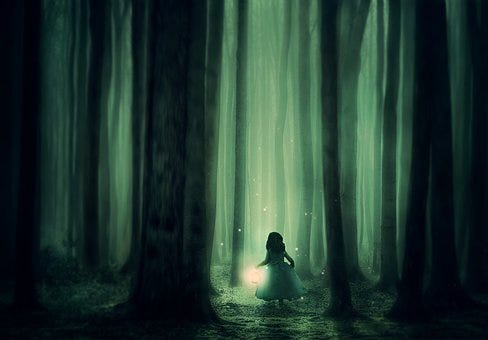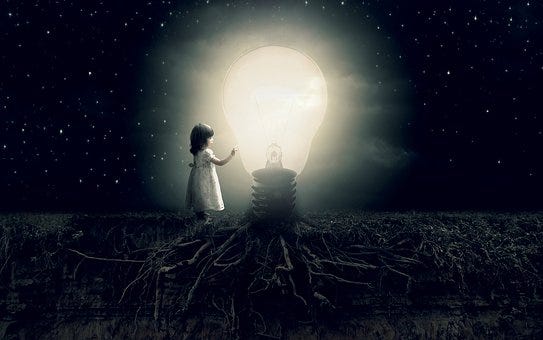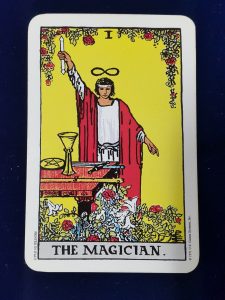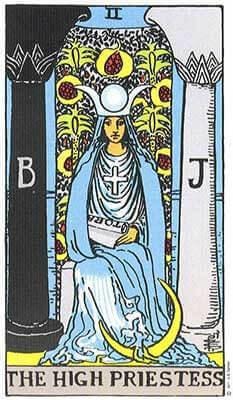That is the title of a book by Medium writer Jack Preston King, which is an anthology of some of his articles. His subtitle is Essays in Defiance of Conformity to Reason. There is one article with the same title as the book, which has the subtitle What if Magical Thinking is the Key to Spiritual Development? I’ve been reading the book recently, and here I am writing in support of his ideas, hopefully adding relevant material.
None of what follows is intended as a rejection of reason, which is a very useful tool when used correctly. I wish merely to point out that it is limited, and that its value is overestimated by its advocates, since it cannot alone lead to a complete understanding of how the universe works.
Some people think otherwise. For example, Richard Dawkins has established a Foundation for Reason and Science, and Steven Pinker has written a book entitled Enlightenment Now: The Case for Reason, Science, Humanism, and Progress. They think that reason and logic are the only tools which science can use to unlock the universe’s secrets. There would be a problem, however, if there were levels of reality, and phenomena, which are actually irrational, which I suggest is the case. For example, Carl Jung describes the psyche as irrational. Richard Dawkins, conveniently for him, does not believe that the psyche, in Jung’s sense, exists.

Lothar Schäfer, who at the time of the following quotes was a Professor of Physical Science, discusses the issue in some depth. He says: “Compatibility with reason is (an) essential aspect of the procedures that we use to establish facts… They will not be accepted if they make no sense. There are laws of thinking correctly, which are summarised in logic, the science of valid reasoning. If it does not conform to logic, it cannot be accepted as a verification of fact”. This suggests that reason and logic should reign supreme. However, he then adds the following reservations:
- “As it turns out, all propositions about reality and all techniques of establishing facts take a lot for granted, and the means of observation and reason that we employ in deriving facts are not as clearly and distinctly factual as the feeling of certainty that they evoke.
- “For example, as to the desired rationality of established facts, the concept presupposes that the logic of the universe must in some ways conform to the logic of the human mind. Why that should be so is by no means self-evident”¹.
He says later that common sense “typically tells us what cannot occur. It is a sense of what is absurd; it tells us what will not happen, rather than what will happen… The problem with this view is that reality is counterintuitive. Common sense is in accord with some of reality but not with all of it”. He offers Einstein’s relativity and the phenomena of the quantum world as two such examples of reality contrary to common sense, therefore counterintuitive²... (Appropriate synonyms for ‘counterintuitive’, I suggest, would be irrational and illogical.)
Here are some quotes, explaining why he says this, beginning with Einstein, who once said: “science cannot solve the ultimate mystery of nature”. If that is correct, then reason must be an inadequate tool. Reflecting upon this inability, he also said: “All these fifty years of conscious brooding have brought me no nearer to the answer to the question ‘What are light quanta?’ Nowadays every Tom, Dick and Harry thinks he knows it, but he is mistaken”³. Even the reasoning powers of the genius Einstein could not solve this mystery!
Turning now to quantum physics, there are several relevant quotes which indicate exactly how irrational the new experimental results appeared:
- “Exploration of the atomic and subatomic world brought them in contact with a strange and unexpected reality. In their struggle to grasp this new reality, scientists became painfully aware that their basic concepts, their language, and their whole way of thinking wereinadequate to describe atomic phenomena. Their problems were not merely intellectual but amounted to an intense emotional and even existential crisis” (Fritjof Capra).
- “I remember discussions with Bohr which went through many hours till very late at night and ended almost in despair; and when at the end of the discussion I went alone for a walk in the neighbouring park, I repeated to myself again and again the question: Can nature possibly be so absurd as it seemed to us in these atomic experiments?” (Werner Heisenberg)
- “I think it is safe to say that no one understands quantum mechanics” (Richard Feynman).
In similar vein, parapsychologist Dean Radin says:
- “It took years to reconcile what I was seeing in those experiments at Bell Labs with what my formal education had led me to expect. I hadn’t realised just how deeply I had accepted the assumptions of conventional science until I came face-to-face with experimental results that ‘shouldn’t be’. At times I became a bit frightened when I started to think about the implications”.
- “One day, as I was complaining to a friend about the results of the experiments, I said, ‘I just can’t imagine how this can be!’ My friend calmly replied, ‘Well, it sounds like you’re limiting yourself’ ”.
- “The difficulties in reconciling ‘magic’ with science were caused entirely by my prior beliefs. The moment I imagined that some aspects of science would simply expand to accommodate psi, and that most established scientific principles would remain the same as before, suddenly there was nothing left to reconcile”.
- “Many very interesting facets of the world are just left out of science altogether… The scientific worldview is far from complete”⁴.
It would seem that these are the problems you encounter if you restrict yourself to trying to understand the universe purely through reason. Interestingly, like Jack Preston King, Radin calls the new discoveries ‘magic’.

There is a further problem. Who gets to decide what is rational, logical, common sense, counterintuitive? The answer given by a dedicated materialist who does not believe in the paranormal, the supernatural, the magical, for example Richard Dawkins or James Randi⁵, will be very different from the one given by Jack Preston King or me. Some of the things that such people consider impossible are:
- ESP — telepathy, clairvoyance, remote viewing, precognition, psychometry, psychokinesis
- spiritual healing, homeopathy, dowsing, astrology, alchemy
- out-of-body experiences
- divination: Tarot readings, I Ching consultations, runes
- belief in synchronistic events
- ghosts, fairies, demons
This list may not be exhaustive, but that is enough to make the point. Let’s suppose, merely hypothesise for a moment, that all of these are actually real, not the fantasies of some misguided individuals still living in the past, rather the skills of those who have freed themselves from the limitations of the rational, ‘scientific’ mindset. If science is meant to be a search for an understanding of the true nature of the universe, wouldn’t we be missing out on an awful lot if we rejected all these as mumbo-jumbo⁶? Wouldn’t we be holding science back in its quest?
I’ll repeat some material from a recent article of mine about the scientist Brian O’Leary. He says that he was once “a typical ‘left-brained’ academic — rationalistic, reductionistic, deterministic, materialistic (who felt he) had the universe and its laws mastered”. Then, as a result of an ESP experience, “my hard-earned scientific belief system was irreversibly shaken”. What he had previously considered ‘poppycock’ “turned out to be true”.
His revised worldview is: “In confronting ‘unexplainable’ phenomena, what I learned was that we — scientists and lay people alike — had isolated ourselves in an invisible box of our own making… We had painted ourselves into a conceptual corner that kept us from asking the most basic questions about ourselves and the universe. As a result we had become prisoners of our own limiting beliefs. Science itself had become a religion, with mechanistic materialism as the Supreme Dogma”⁷.
Or, as the poet William Wordsworth put it:
“…trailing clouds of glory do we come, from God, who is our home: Heaven lies about us in our infancy! Shades of the prison-house begin to close upon the growing Boy”⁸.
Perhaps materialists consider the items on my list irrational and impossible precisely because they are so trapped in the prison of their own minds. (Remember the advice of Dean Radin’s friend above.) They say “extraordinary claims require extraordinary evidence”, even when abundant evidence exists.

Spiritual traditions have always considered intuition and imagination to be faculties higher than reason. They also believe that all humans potentially have ‘magical’ powers, which can be acquired as part of a spiritual training. For example, the third founding principle of the Theosophical Society is “to investigate unexplained laws of nature and the powers latent in humanity”. (Let us not forget that the genius Isaac Newton was a dedicated alchemist who, there is reason to believe, succeeded.)
It is not surprising, given their beliefs, that people like Richard Dawkins, Steven Pinker, James Randi, the late Christopher Hitchens⁹, and many others I could mention, have not discovered these latent powers.
In conclusion, let me just remind you of the subtitle of Jack’s article¹⁰: What if Magical Thinking is the Key to Spiritual Development? Here is a quote from it: “And if, in fact, God, angels, the Blessed Virgin, pagan deities, and even spooky things like extraterrestrials, ultraterrestrials, demons, ghosts, fairies, etc. are real camouflaged components of our environment, capable of meaningfully impacting our world and our lives, shouldn’t we all want to be aware of that?”

Footnotes:
1. In Search of Divine Reality: Science as a Source of Inspiration, University of Arkansas Press, 1997, p17
2. ibid. p132
3. in a letter to M. Besso
4. The Conscious Universe, 1997, new edition HarperCollins, 2009, pp338–9
5. the magician and paranormal ‘debunker’ who wrote Flim-Flam: Psychics, ESP, Unicorns and other Delusions, Prometheus Books, 1982
6. Francis Wheen, for example, has written How Mumbo-Jumbo Conquered the World
7. The Second Coming of Science: An Intimate Report on the New Science, North Atlantic Books, 1992, Foreword Pix.
8. Intimations of Immortality from Recollections of Early Childhood, Stanza 5
9. who said: “The cause of my life has been to oppose superstition. It’s a battle you can’t hope to win — it’s a battle that’s going to go on forever. It’s part of the human condition”. Quoted on Medium by Erman Misirlisoy PhD: https://medium.com/@ermanmisirlisoy/your-brains-battle-between-science-and-superstition-8ff37742682f
10. https://medium.com/@beyondtherobot/in-defense-of-magical-thinking-c24f9cb95e
